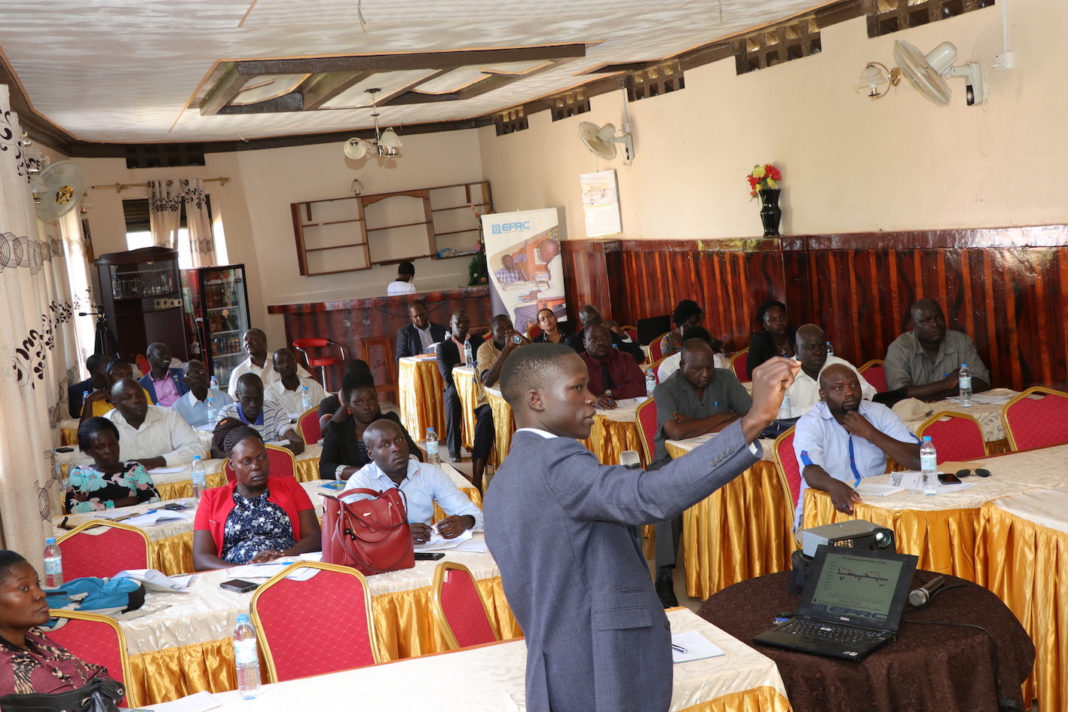Micro economic factors, electricity hiccups, low demand, substandard products and tax policy have been listed as key business constraints in Northern Uganda for the period spanning between 2016 and 2017.
This was revealed during the Business Climate Index (BCI) dissemination held in Arua District recently by Economic Policy Research Centre (EPRC).
Job Lakal, a Research Analyst with EPRC’s Macroeconomics Department while sharing the BCI findings for the Northern region said taxes were a major impediment to business registration. Uganda is ranked 108/190 in Protecting Minority Investors’ (shareholders) rights.
Reactions from participants drawn from Northern Uganda were in line with EPRC findings. Taxes and electricity woes were their biggest challenge in doing business.
Jackson Lee Atima the Chairperson Uganda chamber of Commerce, Arua District and proprietor Hilltop Hotel believes that taxes are unfairly charged. “Am a serious victim, my account was frozen due to a 4 million shilling debt without notice,” he said.
He added that many businesses are left un-assessed and unregistered making the tax body dwell on a few that are registered something which strains turnover.
Atima also decried lack of industrialization in West Nile. “You don’t see industries in West Nile, you don’t see them in Arua, that is a very serious drawback for us,” he said urging government to connect West Nile to the national electricity grid.
According to Atima, power outages have affected small business like salons and printing hubs. This phenomenon does not spare Gulu district either. On November 20, 2018 police dispersed demonstrators in Gulu municipality who were protesting against persistent power outages.
Arua Resident District Commissioner, Nahori Oyaa encouraged the locals to demand for electricity and called for exploitation of solar energy to enable continuous running of industries and general businesses.
Paul Lakuma, a Research Fellow with EPRC, notes that in the past the challenge was lack of electricity but government intervened producing 250-megawatts in excess capacity.
The prevailing paradox however, pertains to stability of power and the cost. “Ugandans pay 15 percent more for power compared to neighboring countries like Kenya, Rwanda and Tanzania” Lakuma said.
He called for more even distribution to ease cost sharing once the greater portion of the population is accessing power. So far about 20 percent of Ugandan households use power from the national grid.
World Bank, Sustainable Energy for All reported 26.7 Ugandan to have had access to electricity by 2016. Uganda is ranked 173/190 in terms of cost of getting electricity.
Other BCI issues raised during the dissemination include limited structural transformation. Industrialization contributes 22 percent to GDP. The agriculture sector, which has continued to lag- although absorbing 40 percent of the labour force, yields only 26% to GDP.
To raise agricultural productivity, participants called for mechanization and irrigation as well as value addition to increase earnings for local farmers.
The BCI summary for Northern Uganda indicates that momentum in business environment did well for most of 2017 across Northern Uganda; it dropped below potential in early 2018 subduing turn over and profitability.
The cost of inputs remained high while new employment is below potential, and in decline. Optimism is below potential and continues to decline.
A similar dissemination was held in Tororo district in November 23, 2018 involving stakeholders drawn from select districts of Eastern Uganda. Gayathry Venugopal, a Research Analyst with EPRC’s Macroeconomics Department shared the summary of BCI findings for Eastern Uganda.
Majority of the business constraints shared with the Northern Uganda community remerged. These include substandard products, unfair taxes among others.
Wazemba David, the in charge Uganda Revenue Authority (URA), Malaba Office called for transparency, pooling of efforts and more awareness to expedite tax collection and ease tensions. This followed an outcry that some URA officials were rude once faced with inquiries and during inspections.
Business owners also complained of unending extortion at the border and on roads leading to the border. For instance, one may encounter 14-16 roadblocks from Malaba to Busitema.
Much as the aim is to maintain security and check on bad trade, some unscrupulous security personnel use these stoppages to extort money from traders.
During the Eastern Uganda BCI dissemination, it was also raised that whereas no Ugandan can cross into Kenya with merchandise, Kenyan traders along the border were easily accessing Uganda soils and trading freely.
George Etyama the District Commercial Officer, Tororo District says government was implementing the village agent model where agents are positioned in villages to connect farmers to traders who have access to exporters. This he hopes will check on standards and ease access to regional markets for local producers.
Access to favorable loans still a challenge
During interactive sessions of the BCI dissemination, inadequate access to soft loans was a matter of concern for both Eastern and Northern region.
This participants say, has bred dubious loan dealers who are often quick on taking over borrowers’ property incase of nonpayment. This is said to be one of the causes of untiring domestic violence.
At least borrowing from commercial banks does not favor most local entrepreneurs.
Paul Lakuma attributes the high interest rates to monopoly saying that 4 banks own 80 percent of banking assets in Uganda. “To protect their interests, such banks can always collude and have a mark up on the price of their products,” he noted.
A few local entrepreneurs have been able to harness and properly manage low interest government loans channeled through avenues like the Uganda Women Entrepreneurship Programme and the Youth Venture Capital Fund.





